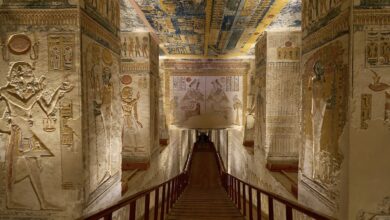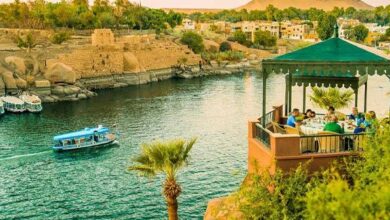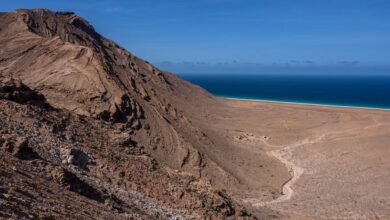
Between the time when the sun disappears behind the mountain ranges to the west and reappears over the sea’s horizon in the east, Sinai nights speak magic.
Nightlife in Nuweiba, located on Sinai’s eastern Red Sea coast, has a do-it-yourself type of entertainment, but there is no manual provided. You must make your own fun, and here lies the magic: Each person contributes what he or she can, be it an instrument, a voice, a dance, a fascinating story, deep wisdom or rip-roaring jokes.
At Little Head camp, people dance salsa and tango in the bungalow by the sea, while onlookers play cards, backgammon, Taboo or chess. Some sit, chatting about nonsensical trivialities, while others wrestle with issues of the heart and the world.
Suddenly, on the horizon, a streaking flame appears and disappears, and the hills on the far side of the bay begin to vibrate with the sound of drums. Ayyash Camp in Ras Shaitan, the epicenter of the music and nightlife scene in the Nuweiba area, is calling. People from the surrounding camps start their pilgrimage across the sand toward the light and sound for a fire show.
Kseniya Golosova is Russian; she learned her skill on the streets of Moscow. She has been living in Ayyash Camp with her children for several months now, and tonight is the second time she will perform.
A canister of natural gas has been acquired for the event, and the fire throwers are ready. They soak each fireball with gas and carefully light each one. Golosova slowly swings the flaming orbs back and forth and whirls them around her body, carving burning arcs in the air while the drums begin.
Golosova dances to the drums as she twirls the fireballs above her head, twisting her body and arms. A crowd makes a circle around the fire dancers, more drummers join, and a lady begins to sing with a high, whining wail.
When the fire show ends, the crowd returns to their places by the campfire. The drummers, with a tabla, a dof, a djembe or bongos, take their places next to the oud and guitars. It is not uncommon to see other instruments, such as the handmade Bedouin simsimeyas, or a nai.
Eslam al-Sha’ary, a longtime resident of nearby Ras Shaitan and a musician who specializes in Indian and Persian music, recalls his first time in Nuweiba.
“When I first came, I saw a guy sitting with a guitar, next to him a girl with a sitar, and two other guys drumming on Persian dofs, and they were playing very spiritual music. People were sitting around the fire,” Sha’ary says. “It feels very right to be in this place.”
Ayyash Camp is well-known for its music. For years, it has been a place where musicians and bands from all over the world come with their instruments to play around the campfire.
An incredible fusion of cultures happens around Ayyash campfires. Egyptians, Sudanese, Bedouins, Israelis, North Americans, Europeans, Indians, Persians and many others come together to make music. The result is a fascinating blend of culture and beautiful improvisation. The Bedouin picks out a tune on a roughly made simsimeya, next to a bass guitar connected to a portable amp. A woman dances in the background while onlookers sip tea and clap in time.
Each person sings in their native language, Sha’ary says. “The songs are all about love. Most of them are about spiritual things, and many of the lyrics are from Rumi and Hafez,” he says, referring to the two Persian poets. “This is the best place for inspiration, not only for me, but for all the musicians that come here.”
Tamer Anwar, a musician from Cairo, says people bring their electronic instruments and portable amps to Nuweiba, even though there is sparse electricity to play chill or psychedelic music.
“There is no better place than this, and this style of music needs no electronic gear,” he says.
Hospitality also characterizes Nuweiba’s night life. Once you step into many of the camps, especially those run by Bedouins, the line between customer and guest fades. The tea you are served around the fire is given to you as an honored guest — the bill can be dealt with later.
Amr Bassiouny, founder of School of the Desert, has been coming to Nuweiba since 2006. He says the Bedouin camp owners “treat their camps like an extension of their own lives and homes, rather than an isolated tourist attraction.”
Bassiouny says nightlife at the camps has a “laid-back, peaceful atmosphere, which allows everyone to be free within themselves.”
At Kum Kum 3 camp, Hajj Hasheish, members of his tribe, and guests listen to a Bedouin poet lyricize love on a simsimeya while they sip whiskey and Red Bull out of teacups. The Bedouins occasionally join in the poetry, with singsong chanting during the chorus, or a burst of rhythmic clapping that stops abruptly, and at just the right moment, leaving only the poet’s sad, high voice singing back to the full moon.
The nights are long, and time warps and crawls by with the progress of the stars and planets across the sky. Only the gray glow on the horizon and the dying embers of the fire will tell you that the night has come to a close and it is time to go to bed.




